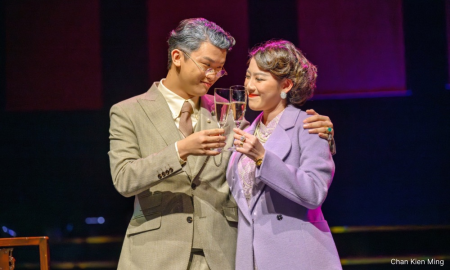A Review of KLPAC’s The Sisters Soong
For the first two parts of the play, I thought “The Sisters Soong” felt very confused and struggled with its own identity.
It tackled the real history of the Soong sisters with a certain irreverence, opening with elaborate dance numbers, a Chinese-influenced jazz orchestra, and a charming fourth-wall-breaking narrator, played wonderfully by Omar Ali.
But then it shifted into soap-opera-like scenes, in what seemed an attempt to sanitise a very messy history. It was only by the third act that I realised what they were trying to do, and how beautifully they had done it.
“The Sisters Soong” is based on the real story of the daughters of Chinese business magnate Charlie Soong, who would involve themselves with some of the most important figures of early 20th century China.

The eldest sister, Soong Ai-Ling (Ruby Yap), married China’s richest man, HH Kung (Jerry Pang).
Soong Ching Ling (MayJune Tan), the middle sister, was married to Sun Yat-sen (Dennis Lee), the first president of the Republic of China.
The youngest, Soong Mei-ling (Jane Tee), married Chiang Kai-shek (Tan Li Yang), the leader of the Kuomintang, and later commander in chief of the Chinese armies.
It was written and directed by the duo of Joe Hasham and Faridah Merican, legends of the Malaysian stage and founders of The Actors Studio, which has been one of the pillars of Malaysian theatre since its inception in 1989.
Lives and conflicts
As I said, I thought the play began with a beautiful spectacle. It established character, setting, and tone, while also delivering some much-needed exposition.
The way the sisters and their husbands entered the stage in such a glamorous manner, even addressing their deaths to the audience, made it seem as if they had just crashed into purgatory.

Instead of following a traditional, chronological narrative around the three sisters, we are treated to various snippets and vignettes of their lives and conflicts. From this, we learn of the sisters’ turbulent relationships with their father, their husbands, and even among themselves.
However, these scenes, which made up a majority of the second act, felt lacking in its execution. The exposition was clunky, the stories they chose to portray were sometimes baffling, and they seemed to have taken a very forgiving and sanitised look into the Soong sisters’ story.
It only managed to win me back in its third act, with what is undoubtedly the most powerful scene of the whole play. If their introduction was their entrance to purgatory, this was their judgment.
Our couples stood apart from each other on stage, solemnly still, and delivered a monologue one by one. There was no music, no dancers, and no narrator to disturb the flow.
Just their pleading, explaining, rationalising, or even just talking. Their guilt, confessions, and anxiety spilt out like a flood that snuffed the flame they lit in the beginning.
And then the story ends.
Will history be kind?
At the end of the second act, the Soong parents sit at the breakfast table and realise their children have outgrown their parents, each having rebelled their own way, and are very worried for not just their futures, but their legacies.

“Do you think,” Charlie asks, “history will be kind to them?”
Perhaps Joe and Faridah had asked the same question themselves, and realised they had put themselves in the difficult situation of having to answer it.
And what did they choose, in the end? They chose to be kind.
They omitted the difficult parts of their story, of blackmail, adultery, and embezzlement.
But the play isn’t ignorant of these facts. There is no revisionist attempt here. In fact, it addresses them through our narrator, speaking perhaps for Joe and Faridah.
The duo has deliberately chosen not to portray the Soong sisters as historical figures, but as people in circumstances beyond them, and in doing so, perhaps hoped to make history a bit kinder for them.
They attempted the impossible: to tackle the massive history behind the Soong sisters within a two-hour play, to impart some sense of the people they were and the legacy they’ve left behind, and to keep their story alive for this next generation.
They carried this immense weight with poise and respect, and although their knees may have buckled during the second act, they recovered and lifted it high above their heads in the third, creating one of the finest moments in recent Malaysian theatre.
Darren Tio is a KL-based writer who grew up in Pontianak, Indonesia, and has a degree in creative writing.
This review was published on MalaysiaKini.com as part of ARTSEE NETWORKS’s Art Writers’ Sandbox programme.


Leave a Reply